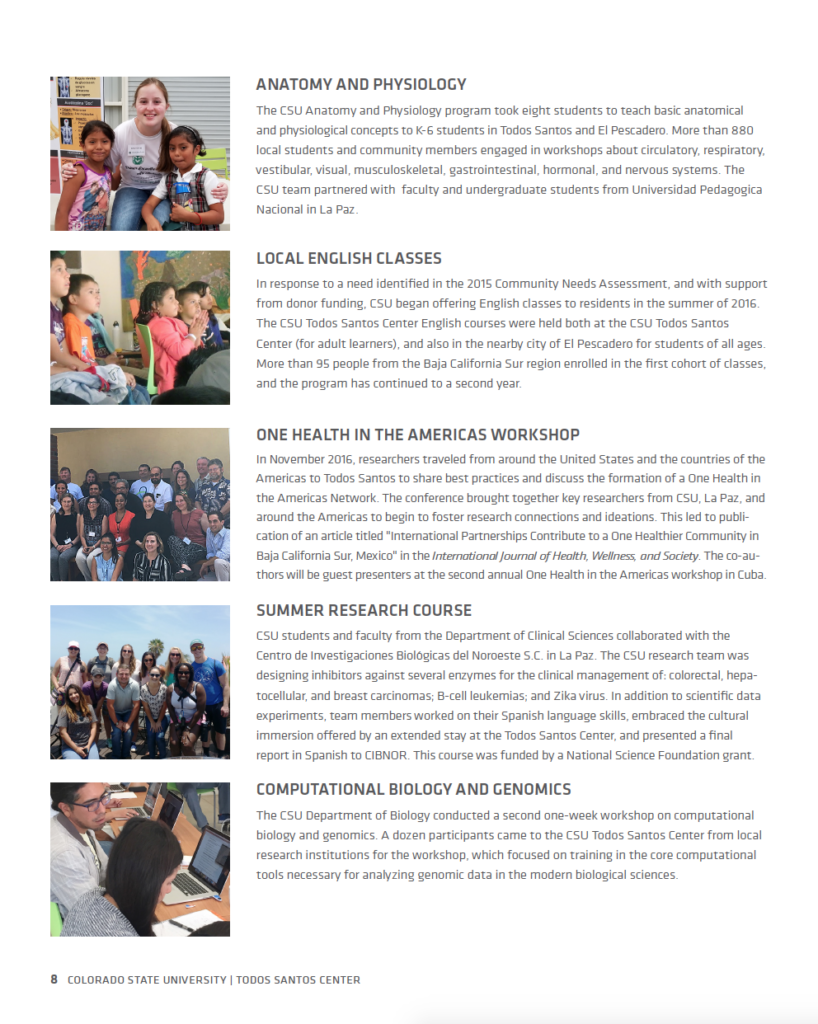Original story by Tiana Nelson
The Colorado State University Todos Santos Center issued its 2016-2017 Program Report this week, including highlights from the College of Veterinary Medicine and Biomedical Sciences.
“As the CSU Todos Santos Center enters its third full year, we remain committed to our core mission, which is to cultivate generations of global citizens and thriving communities through collaboration, experience, and exchange of knowledge,” said Kim Kita, Director of Special Projects and Partnerships at CSU.
The report outlines more than 50 community partners engaged with the university’s international hub, and showcases more than a dozen for-credit courses at the Center for CSU students. Programs developed by the college have helped 1,127 animals in the Baja California area through spay/neuter clinics, ranch visits and community outreach.
“These numbers demonstrate the academic and community efforts that have taken place through the Colorado State Todos Santos Center, but we know the impact is much greater,” said Tony Frank, CSU president.
After two years of programming at the Center, CSU has integrated into the region, offering annual programs and courses such as a Kids Do It All theatre program with students from Colorado and Mexico working together to create a community play, regular spay/neuter and vaccinations clinics for pets in partnership with local partners, service learning collaborations, and joint research in ecology, wildlife biology, agriculture, among others.
The offerings at the Center have been a conduit for building relationships and cultural understanding, Frank said.
“It is with great pride that we take this opportunity to reflect on the impact of the programs offered through our Todos Santos Center,” he said. “We are grateful to the community of Todos Santos for partnering with us, and we look forward to deepening our connection in the coming years through expanded programming and enhanced interactions among learners.”
College research, outreach and externships
The College of Veterinary Medicine and Biomedical Sciences conducts two animal-based research projects in Todos Santos: a multiyear research study in collaboration with public health officials and veterinarians to determine the prevalence of tick-borne disease among pets in the region, and a survey to understand the needs and challenges of subsistence ranching in the region.
 The Veterinary Student Externship Program introduced two outreach programs focusing on information exchange with the community: an after-school education program for youth interested in animal care and well-being, and the creation of a support and educational network for animal rescue organizations within Baja California Sur.
The Veterinary Student Externship Program introduced two outreach programs focusing on information exchange with the community: an after-school education program for youth interested in animal care and well-being, and the creation of a support and educational network for animal rescue organizations within Baja California Sur.
The externship program engages fourth-year CSU veterinary students in two-week educational and cultural exchange opportunities in Baja California Sur. Throughout the year, eight teams of CSU students provided surgical and medical support to local shelters, participated in spay/neuter campaigns, and observed clinical cases at the UABCS Veterinary Teaching Hospital. The teams participated in nine community spay/neuter campaigns, providing more than 700 free surgeries to the public.
CSU students and faculty from the Department of Clinical Sciences collaborated on Zika virus and cancer investigations with the Centro de Investigaciones Biológicas del Noroeste S.C. in La Paz.
The CSU Anatomy and Physiology program took eight students to teach basic anatomical and physiological concepts to K-6 students in Todos Santos and El Pescadero. More than 880 local students and community members engaged in workshops about circulatory, respiratory, vestibular, visual, musculoskeletal, gastrointestinal, hormonal, and nervous systems.